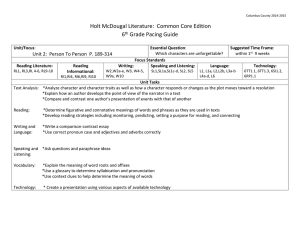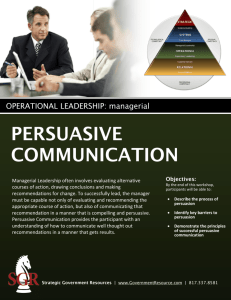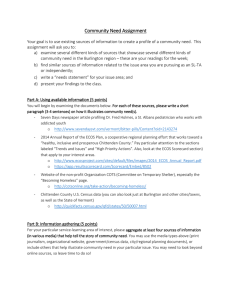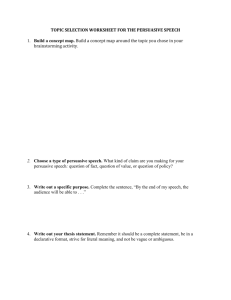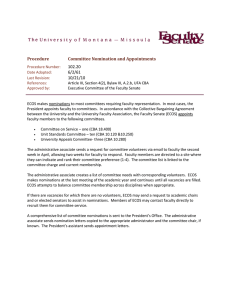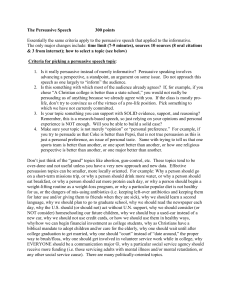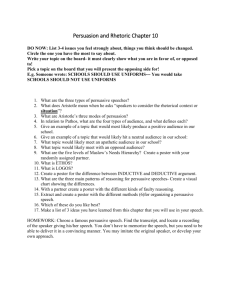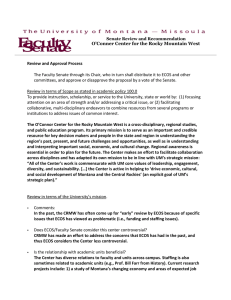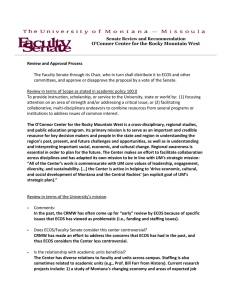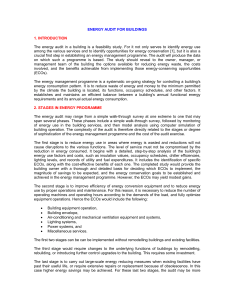ELA-6th-grade-pacing-guide-Unit-8
advertisement
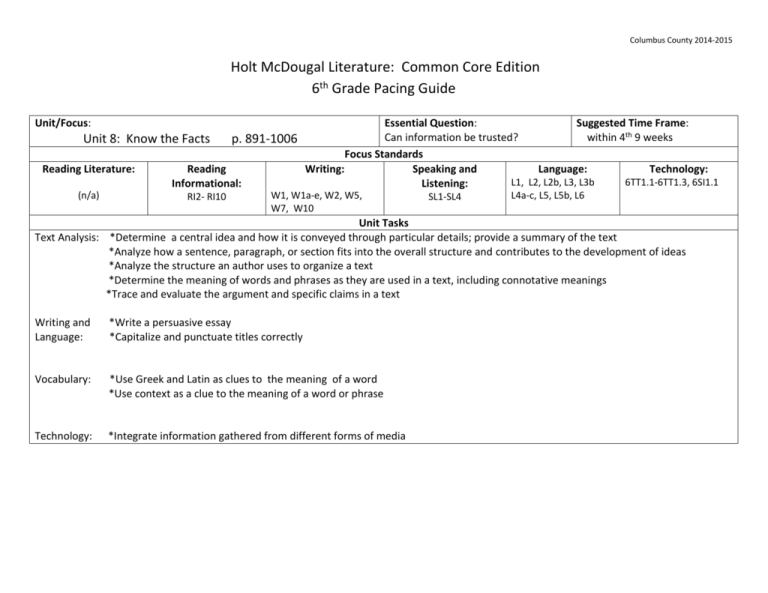
Columbus County 2014-2015 Holt McDougal Literature: Common Core Edition 6th Grade Pacing Guide Unit/Focus: Essential Question: Suggested Time Frame: Can information be trusted? within 4th 9 weeks Unit 8: Know the Facts p. 891-1006 Focus Standards Reading Literature: Reading Writing: Speaking and Language: Technology: L1, L2, L2b, L3, L3b 6TT1.1-6TT1.3, 6SI1.1 Informational: Listening: (n/a) RI2- RI10 W1, W1a-e, W2, W5, W7, W10 SL1-SL4 L4a-c, L5, L5b, L6 Unit Tasks Text Analysis: *Determine a central idea and how it is conveyed through particular details; provide a summary of the text *Analyze how a sentence, paragraph, or section fits into the overall structure and contributes to the development of ideas *Analyze the structure an author uses to organize a text *Determine the meaning of words and phrases as they are used in a text, including connotative meanings *Trace and evaluate the argument and specific claims in a text Writing and Language: *Write a persuasive essay *Capitalize and punctuate titles correctly Vocabulary: *Use Greek and Latin as clues to the meaning of a word *Use context as a clue to the meaning of a word or phrase Technology: *Integrate information gathered from different forms of media Unit Vocabulary Academic Vocabulary for the unit: *adequate *authority *concept Story and pages “SuperCroc” p. 898-907 ECOS “Bird Brains” *purpose *structural p. 908-915 “The First Emperor/Digging Up the Past” p. 916-931 ECOS “Media Study: News Reports” p. 932-935 “What Video Games Can Teach Us/The Violent Side of Video Games” p. 942-951 “Should Wild Animals Be Kept as Pets?” p. 952-959 “No Thought of Reward” p. 960-965 “Start the Day Right!” p. 966-971 ECOS “Shine-n-Grow: Hair Repair That Really Works!” p. 972-977 ECOS Academic Vocabulary text features captions subheadings summarize graphic aids main ideas statistics proposition example supports expert opinions facts synthesize information thorough sound bites interviews quotes argument irrelevant examples claim faulty reasoning vague language persuasive techniques loaded language emotional appeals preview appeals to authority skim author’s message persuasion implied rhetorical question public service announcement persuasive logic overgeneralization faulty reasoning logical fallacies false cause circular reasoning hasty generalization Context Vocabulary species predator expert extinct fossil complexity engage mimic perception archaeological barbarian surpass immortality n/a captivate simulate precise captivity domesticate instinctive appreciate contribute propaganda n/a variation ancestor disintegrate dedicate reconstruction excavation preservation complicated unsuitable dedication “Brain Breeze” p. 978-983 ECOS propaganda bandwagon appeal stereotype Media Study: Persuasive Techniques in customer awareness Commercials p. 984-987 ECOS target audience demographics name-calling snob appeal endorsement n/a n/a *Denotes stories that are also in The Language of Literature text book. Note to Teachers: The Common Core Essential Standards focus on teaching quality, rigorous lessons. Therefore, this pacing guide allows teachers the flexibility to select from the stories in each unit. Teachers are not expected to use every story within an entire unit. Unit Student Workshops/Assessment Practices Text Analysis Workshop: Reading for Information Text Analysis Workshop: Argument and Persuasion Writing Workshop: Write To Learn Speaking and Listening Workshop: Giving a Persuasive Speech Assessment Practice p. 894-897 p. 936-941 p. 998-999 p. 1000-1005 Unit 8 Project Ideas to Incorporate Technology Divide student into small groups and ask them to create a field guide about crocodiles. Publish the guides in the form of a slide show. Present the field guides to the class. Brainstorm with students a list of people who have devoted themselves to help others or to champion an important cause. Have groups of students research a person from the list and use the information to prepare a script for a short documentary about the individual. Have students research wartime propaganda and present the findings to the class. Students will work in small groups to create a new product. Working cooperatively, they will create a commercial for the product and present it to the class.
